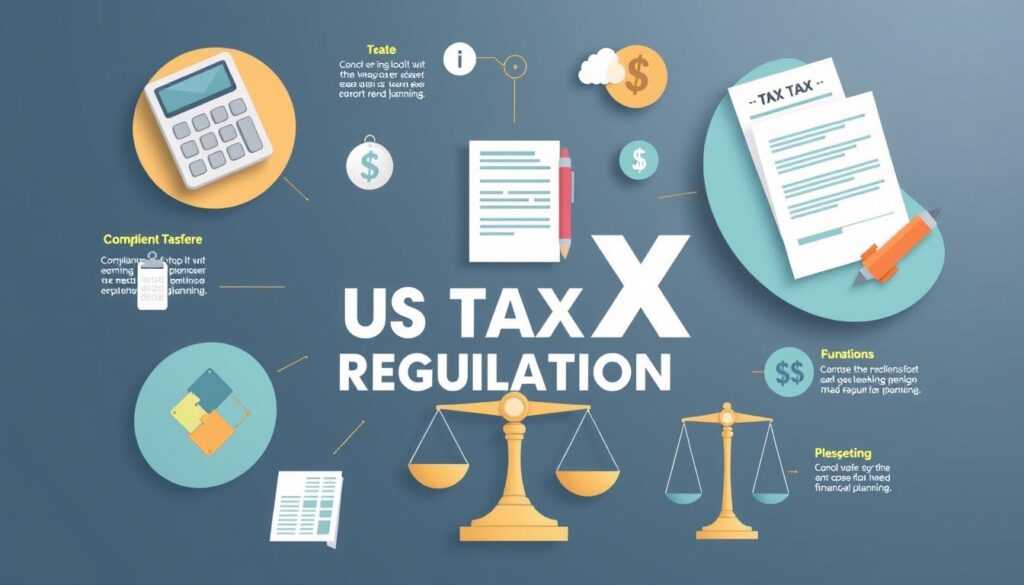As tax season approaches, many feel a familiar mix of anxiety and uncertainty. You might find yourself poring over piles of paperwork, wondering if you’ll miss a vital deduction or be hit with unexpected penalties. Understanding tax regulations is not just about compliance; it is about ensuring that you are protected and empowered to make the most of your financial situation. Whether you’re an individual taxpayer or a business owner, grasping the ins and outs of IRS guidelines can save you time, stress, and potentially significant amounts of money. As the IRS projects an estimated average gross tax gap of $540 billion per year, staying informed is more crucial than ever. Moreover, the 2022 Inflation Reduction Act allocated an additional $79.6 billion in funding to the IRS, amplifying their efforts to enforce compliance more rigorously than in the past12.
Key Takeaways
- Tax regulations are essential for ensuring compliance and avoiding penalties.
- Staying updated with IRS guidelines can save you from costly mistakes.
- Utilizing tax professionals can significantly enhance your compliance efforts.
- Understanding the tax landscape can empower you toward better financial planning.
- Regular audits of your financial records can unveil discrepancies early.
Understanding the Basics of Tax Regulations
Tax regulations comprise critical guidelines established by the IRS and other governmental bodies, detailing how taxes are reported and paid. Various types of regulations play a significant role in shaping tax compliance. These include legislative, procedural, and interpretive regulations, each contributing to a better understanding of tax law updates.
What Are Tax Regulations?
In the U.S., the primary framework for tax regulations is the Internal Revenue Code (IRC), which consists of thousands of numbered sections specific to various tax rules and levies3. The U.S. federal tax code is dynamic, changing in response to economic shifts and political developments, which impacts how taxpayers must comply with regulations3. Regulations are published in the Federal Register following their proposed form in a Notice of Proposed Rulemaking (NPRM), ensuring transparency4.
Key Terminology You Should Know
Understanding key terms enhances your ability to navigate tax regulations efficiently. Terms like “tax compliance” refer to the adherence to these regulations, ensuring timely and accurate tax reporting. Other essential phrases include “tax gap,” signifying the unpaid taxes owed by taxpayers, and distinctions between various forms of IRS communications, such as Revenue Rulings, which clarify how laws apply to specific scenarios4. Overall, staying informed about tax law updates can significantly aid in achieving compliance that aligns with federal expectations.

Types of Taxes You Need to Know
Understanding the various types of taxes is essential for effective financial planning and compliance in the United States. There are three primary taxes you should be aware of: income tax, sales tax, and property tax. Each plays a crucial role in funding government services and requires your attention for accurate filing.
Income Tax
Income tax is imposed on individuals and businesses based on their earnings. For individuals, rates vary significantly, ranging from 10 percent to 37 percent depending on specific income thresholds5. In fiscal year 2021, income tax accounted for 42.1% of total tax revenue collected by the U.S. government6. Corporate income tax has been adjusted as well; the federal corporate income tax rate was reduced to 21 percent under the Tax Cuts and Jobs Act of 20175.
Sales Tax
Sales tax applies to most goods and services sold in the U.S. The rates can differ widely across states and localities, with 45 out of 50 states currently collecting sales taxes. In some places, combined state and average local sales tax rates exceed 9%6. Sales tax is a significant contributor to state revenue, funding public services and infrastructure.
Property Tax
Property tax is levied on real estate and remains one of the largest sources of revenue for both cities and states. This tax supports essential public services such as education, law enforcement, and emergency services. Understanding how property taxes are assessed can help you manage your real estate investments more effectively.

Filing Your Taxes: A Step-by-Step Guide
Completing your tax filing can be simplified by adhering to a clear process. The first step is to gather all necessary documentation, which includes W-2 forms, 1099s, and receipts for any deductions you intend to claim. Keeping your records organized will not only assist in filing but also in safeguarding against potential IRS audits.
Gather Necessary Documentation
Proper documentation is crucial for accurate tax filing. Essential documents include:
- W-2 forms from your employer
- 1099 forms for freelance or contract income
- Records of deductible expenses such as medical bills or mortgage interest
- Last year’s tax return for reference
By preparing these documents ahead of time, you will streamline the tax filing process.
Choose the Right Tax Form
Selecting the appropriate tax form can significantly affect your filing experience. There are several forms, such as:
- Form 1040 for individual filers
- Form 1040-SR for seniors
- Form 1065 for partnerships
Using the correct form ensures compliance with IRS guidelines and maximizes potential deductions and credits, which could lower your taxable income. For instance, the standard deduction varies based on filing status, with amounts ranging from $12,550 for single filers to $25,100 for married couples filing jointly in 20217.
E-filing vs. Paper Filing
When it comes to filing your taxes, you have the option of e-filing or opting for paper filing. E-filing is often faster and more convenient, allowing for quicker refunds. For most filers in 2023, the deadline for submitting tax returns is April 15, 20248. E-filing typically means fewer errors, as the software guides you through the process and performs the calculations. Many taxpayers earning $79,000 or less can also make use of IRS Free File for electronic filing8. Conversely, if you prefer traditional methods, ensure that your paper forms are filled out accurately to avoid delays.

Regardless of the method you choose, understanding IRS guidelines, staying organized, and timely filing will lead to a successful tax season.
Important Tax Deadlines
Being aware of key tax deadlines is crucial for ensuring compliance with IRS guidelines. The standard deadline for most individual tax filings is April 15, 2024, except for residents of Maine and Massachusetts, where the deadline is April 17, 20249. Marking your calendar with these dates can help avoid any last-minute rush.
Annual Filing Deadline
The IRS requires that tax returns be filed by the specified due date each year. For 2024, this is April 15, but if you find yourself needing more time, you can file an extension request using Form 4868. This allows an automatic extension of up to six months, pushing the new deadline to October 15, 202410. Remember, though, an extension to file does not extend the deadline for paying any taxes owed, and interest will accrue on any unpaid taxes after the original due date9.
Extension Requests and Their Implications
Extension requests can be a lifesaver, particularly during times of unforeseen challenges. For individuals affected by federally declared disasters or military service, additional time may be granted under specific IRS guidelines9. If you’re unable to pay your total tax balance, the IRS offers various options, including payment plans to alleviate the financial burden9.

To summarize key dates and details surrounding the filing process, consider the following table:
| Deadline | Description | Special Notes |
|---|---|---|
| April 15, 2024 | Individual Tax Filing Due Date | April 17 for Maine and Massachusetts residents9. |
| October 15, 2024 | Extended Filing Due Date | Applicable if Form 4868 is filed10. |
| April 15, 2025 | First Estimated Tax Payment | Covers income from January 1 – March 3110. |
| October 15, 2025 | Final Extension for Individual Tax Returns | Last day to file if a six-month extension is granted10. |
Deductions and Credits Explained
Understanding tax deductions and tax credits is essential for effective tax planning and can significantly lower your tax liability. The IRS guidelines outline two main approaches to deductions: standard and itemized. Knowing the differences can help you make informed decisions when filing your taxes.
Standard vs. Itemized Deductions
The standard deduction for the 2023 tax year varies by filing status: $13,850 for single or married individuals filing separately, $27,700 for married couples filing jointly or qualifying surviving spouses, and $20,800 for heads of households11. If your deductions exceed the standard deduction, you can choose to itemize. Common itemized deductions include:
- Mortgage interest
- Charitable contributions
- Medical and dental expenses exceeding 7.5% of adjusted gross income
- Losses from gambling
Many taxpayers, especially those unable to take the standard deduction, can benefit from itemizing their deductible expenses, which include alimony payments, business use of a vehicle or home, and student loan interest11.
It is important to keep in mind that personal exemptions were suspended in 201812.
Common Tax Credits
Tax credits directly reduce the amount of tax you owe, offering a dollar-for-dollar reduction. For example, a $1,000 credit can lower your tax bill by $1,00012. Some notable tax credits include:
- Earned Income Tax Credit
- Education credits
- Saver’s credit
- Premium Tax Credit for health insurance
Taxpayers like Josh and Kristen saw their overall tax bill decreased significantly after applying child tax credits, showcasing the potential impact of tax credits on taxable income12.

Self-Employment and Taxes
If you are self-employed, understanding the tax landscape is essential for maintaining compliance and optimizing your earnings. Self-employment tax is a crucial component of your tax reporting process. It is designed to cover Social Security and Medicare taxes on your net earnings.
Understanding Self-Employment Tax
The self-employment tax rate stands at 15.3%, including 12.4% for Social Security and 2.9% for Medicare, which you need to take into account when calculating your overall tax liability13. If your net earnings from self-employment reach at least $400, you’re required to file an income tax return14. Moreover, the first $168,600 of your combined wages, tips, and net earnings is subject to Social Security tax. Keep in mind that an additional 0.9% Medicare tax applies if your income goes beyond specified thresholds based on your filing status13.
What You Need to Report
Accurate tax reporting is vital. Not all income may be apparent, especially if you receive cash payments, which need to be reported to ensure you’re not underreporting your earnings. Also, it’s crucial to maintain documentation of your income and expenses. For instance, home office deductions can be available to both homeowners and renters, potentially easing your taxable income burden14.
To make self-employment tax payments, you must possess a Social Security number (SSN) or an individual taxpayer identification number (ITIN)13. Furthermore, as a self-employed individual, you might need to file estimated taxes quarterly to stay on top of your self-employment tax obligations.

Staying Compliant with Employment Taxes
Understanding your responsibilities regarding employment taxes is crucial for avoiding penalties and ensuring tax compliance. Compliance with payroll taxes not only supports vital federal programs but also protects your business from hefty fines.
Payroll Taxes Explained
Federal payroll taxes contribute significantly to funding programs like Social Security and Medicare, where both employers and employees share a 15.3% contribution for FICA taxes15. Additionally, the Federal Unemployment Tax Act (FUTA) mandates employers to pay unemployment taxes, which provides a safety net for those seeking jobs16.

Employer Responsibilities
It’s essential to fulfill all employer responsibilities, as noncompliance can lead to severe penalties. For example, if your payroll tax deposits are over 15 days late, you may incur a 10% penalty15. Furthermore, common payroll mistakes, such as misclassifying workers or incorrect tax form usage, can result in significant fines16.
| Tax Type | Employee Contribution | Employer Contribution |
|---|---|---|
| Social Security | 6.2% of gross income | 6.2% of gross income |
| Medicare | 1.45% of gross income | 1.45% of gross income |
| FUTA | N/A | 0.6% (after credit) |
By staying informed about payroll tax regulations and employing best practices, you can minimize risks and ensure compliance. Investing in payroll compliance software can help streamline processes and reduce administrative burdens while maintaining accuracy in tax calculations17.
International Tax Regulations
Understanding international tax regulations is essential for U.S. taxpayers with foreign income or assets. These regulations outline your tax obligations and reporting requirements, which can be complex due to various trade treaties with other nations. The United States has income tax treaties with numerous countries designed to prevent double taxation and lower your tax burden on foreign income.
Tax Obligations for Foreign Income
U.S. citizens and residents must report their worldwide income, including foreign earnings, on their taxes. Tax treaties generally help reduce the U.S. taxes owed by foreign residents, ensuring that you pay only the necessary amount as outlined in agreement provisions18. For instance, a typical tax treaty may stipulate a withholding tax rate of 15% on dividends paid by U.S. companies to their foreign shareholders19. If you’re a U.S. taxpayer living abroad, specific rules like the Global Intangible Low Tax Income (GILTI) guide how you report and tax your foreign income, particularly regarding profits and income from royalties and dividends19.
Reporting Foreign Assets
Foreign assets must be reported meticulously to comply with international tax regulations. You might be required to file additional forms, such as the Foreign Bank Account Report (FBAR), if you maintain foreign bank accounts that exceed certain thresholds. This is in line with policies aimed at reducing tax avoidance, which include anti-avoidance rules and regulations on transfer pricing and controlled foreign corporations19. Furthermore, you may need to provide proof of residency for claiming treaty benefits, as residency is determined by applicable treaties18. Ensuring rigorous compliance with these reporting requirements is vital to avoid penalties and tax implications.

| Country | Tax Withholding Rate on Dividends | FBAR Filing Requirement |
|---|---|---|
| Canada | 15% | If total foreign accounts exceed $10,000 |
| UK | 15% | If total foreign accounts exceed $10,000 |
| Germany | 15% | If total foreign accounts exceed $10,000 |
Being aware of your international tax obligations and maintaining compliance with reporting standards ensures a smooth experience in dealing with your foreign income and assets. Stay informed about the evolving international tax regulations to make the most of available benefits while fulfilling your tax responsibilities1918.
Tax Planning Strategies
Incorporating effective tax planning strategies can significantly reduce your tax burdens and optimize your financial outcomes. Understanding taxes early on allows you to fully leverage available deductions and credits. You can create a proactive strategy that aligns with current tax reforms to minimize your liabilities effectively.
Importance of Early Planning
Early tax planning is crucial for achieving substantial tax advantages. By staying informed about tax reforms and adjustments, you can adapt your strategies accordingly. This includes claiming deductions and utilizing various tax credits that may be applicable to your situation. In 2023, the IRS increased the home office deduction, allowing a deduction of $5 per square foot for home office space, capped at 300 square feet20. Similarly, contributions to retirement accounts, such as Traditional and Roth IRAs, can lower your taxable income significantly20.
Utilizing Tax-Advantaged Accounts
Tax-advantaged accounts are a vital tool in your tax planning arsenal. Through strategies like tax-loss harvesting, you can offset capital gains and decrease your overall tax liability20. Research and development (R&D) expenses involved in business growth can also qualify for deductions, providing significant tax advantages21. Understanding these accounts helps ensure that as tax reforms evolve, your planning remains relevant and effective.

| Tax Advantage Method | Description | Potential Savings |
|---|---|---|
| Retirement Accounts | Lower taxable income through contributions | Variable based on contribution limits |
| Home Office Deduction | Deduct $5 per square foot for home office | Up to $1,500 for 300 square feet |
| Tax-Loss Harvesting | Offset capital gains with losses | Variable based on capital gains |
| R&D Expense Deductions | Claim deductions for R&D initiatives | Variable based on expenses incurred |
Staying proactive in financial planning is beneficial for meeting future tax obligations. With a comprehensive approach to tax planning strategies and awareness of recent tax reforms, you can optimize your financial strategy22.
Understanding IRS Audits
Facing an IRS audit can be overwhelming, yet being informed about the process and its triggers is essential for effective tax preparedness. Awareness of audit triggers can significantly reduce the chances of being selected, while adequate preparation can ease the experience if an audit does occur.
What Triggers an Audit?
The IRS utilizes various methods to select returns for audits, including random selection and computer screening based on statistical formulas derived from audits of a statistically valid random sample of returns23. Audits can often stem from discrepancies in income reporting or unusual deductions. Less than half of 1% of individual tax returns were audited in 2019, highlighting that, although audits are uncommon, certain factors like income level and return complexity can influence the likelihood of being audited24. For example, roughly 0.2% of filers earning between $200,000 and $500,000 were audited in 2020, while approximately 8.7% of those earning $10 million or more faced audits in the same year24.
How to Prepare for an Audit
Preparation is key when it comes to IRS audits. Taxpayers should gather all supporting documentation used for their tax filings, ensuring they can substantiate every item claimed. The IRS typically notifies taxpayers by mail regarding an audit, which can take the form of a mail audit or an in-person interview at various locations, such as the IRS office or a taxpayer’s home23. It is prudent to keep all relevant records for at least three years from the filing date, as this duration often aligns with the statute of limitations for tax assessments23. If you disagree with the audit findings, there are options available, including requesting a conference with an IRS manager or filing an appeal23. By staying organized and understanding your rights during the audit process, you can navigate these challenges more effectively.

Common Mistakes to Avoid
When filing your taxes, it’s essential to be aware of common tax mistakes that could cost you in the long run. Many taxpayers unknowingly make errors in income reporting or miss out on valuable tax deductions. By taking the necessary precautions, you can improve your filing experience and ensure accuracy.
Errors in Reporting Income
One frequent error is related to inaccurate income reporting. Taxpayers must ensure they correctly enter information regarding wages, dividends, and any other income sources to avoid penalties and processing delays25. The IRS has found nearly 2.5 million math errors on returns, often stemming from careless mistakes in reporting26. Moreover, filing prematurely can lead to errors because you may not have all the necessary documents at hand, resulting in potential processing delays25.
Missed Deductions
In addition to income reporting errors, failing to claim eligible tax deductions is a common oversight. Many taxpayers overlook deductions that could significantly lower their tax liability. Tax software can help you identify and calculate these credits accurately, ensuring you receive the maximum refund possible2526. Remember that signing an unsigned tax return makes it invalid27. Utilize e-filing options, as they often lead to fewer mistakes and can help process your refund more quickly compared to paper returns, which have an error rate of 21%26.

Seeking Professional Help
Knowing when to consult a tax professional can significantly reduce your stress during tax season. Engaging in a tax consultation is especially advisable if your tax situation involves complexities such as significant life events or intricate investments. For instance, major changes such as marriage, the birth of a child, or inheriting wealth often prompt individuals to seek guidance from qualified tax experts.
When to Consult a Tax Professional
If you find your financial situation confused by various IRS guidelines, it might be time to reach out for assistance. A robust understanding of tax laws can become overwhelming, and professional help ensures that you navigate these regulations effectively. The State of the Tax Professionals Report from Thomson Reuters found that 66% of clients prefer comprehensive business advice rather than just tax preparation from their advisors28. Engaging a tax professional can help you receive the detailed insights you need to make informed decisions.
Types of Tax Professionals
Tax professionals come in various forms, including Certified Public Accountants (CPAs), tax attorneys, enrolled agents, and some financial advisors29. Each type offers distinct services tailored to your needs, such as identifying deductions, complying with evolving tax laws, or planning for investments. Recently, 35% of tax firms indicated plans to invest in AI technology to enhance their services, demonstrating the dynamic nature of the profession28. Tax advisors play a critical role in staying up-to-date on regulations and helping clients reduce their tax liabilities legally.

The Role of Technology in Tax Preparation
Embracing technology transforms tax preparation, streamlining processes and enhancing efficiency. Tax software options available today play a vital role in guiding you through the complexities of filing your taxes. These tools not only help ensure compliance but also save you valuable time during the hectic tax season. With tax technology evolving rapidly, integrating innovative solutions into your tax strategy has never been more critical.
Tax Software Options
Various tax software options offer powerful features tailored to meet diverse tax needs. The combination of advanced analytics, user-friendly interfaces, and robust integration capabilities facilitates a smoother experience. According to recent reports, around 71% of tax leaders are coordinating digital investments to enable business transformation, which underscores the importance of using updated tax software to manage complexities effectively30. PwC’s innovative tax platform, Sightline, provides clients with insights into their tax ecosystem while continuously expanding its data acquisition and analysis services30.
Mobile Apps for Tracking Expenses
Mobile apps have become increasingly important for tracking expenses, providing real-time data that assists in informed decision-making. These apps enhance your ability to organize financial information and prepare for tax season, significantly reducing the burden of manual tracking. By automating many processes, including transaction analysis and anomaly detection through AI, tax departments can better manage their resources and avoid costly mistakes31. As nearly 10,000 businesses worldwide adapt to new requirements under the Global Minimum Tax, mobile apps equip you with essential tools to streamline compliance efforts effectively31.

Impact of Tax Law Changes
Staying updated on tax law changes is key to effective tax planning. Recent IRS updates may alter deductions, credits, and tax rates, making it necessary for you to adjust your tax strategies accordingly.
Recent Changes You Should Be Aware Of
The IRS’ “7520 rate” increased to 5.8% in December 2023, up from 4.2% in June 202332. The top tax bracket for individual taxpayers, estates, and trust income will revert to 39.6% after 2025, transitioning from the current rate of 37%32. Additionally, the number of taxpayers affected by the Alternative Minimum Tax (AMT) is projected to rise from several hundred thousand to 6.7 million by 202632. More changes will occur as the unified estate and gift tax deduction is set to decrease from $12.92 million per individual in 2023 to approximately $6.8 million by 202632.
Recent provisions under the Tax Cuts and Jobs Act are also noteworthy. For instance, the new deduction for qualified business income allows some pass-through entities to deduct up to 20% of their eligible income33. Simultaneously, there are limits on deductions for meals and entertainment expenses, capped at 50% for expenses directly related to active business conduct33. Changes are occurring for like-kind exchanges, which now only apply to certain real property exchanges, and payments in sexual harassment cases can no longer be deducted33.
How to Adjust Your Planning Accordingly
To navigate these evolving regulations, reviewing IRS guidelines consistently is crucial for effective tax planning. Set a schedule to assess your tax situation periodically, as provisions from the Tax Cuts and Jobs Act will differ in impact by individual circumstances34. As this act is set to expire at the end of 2025, understanding the expected increase in tax rates and potential changes in deductions is essential34. The proactive approach includes exploring tax-advantaged accounts and other planning strategies to mitigate potential tax liabilities in the upcoming years.

Remedies for Tax Problems
Encountering tax problems can be overwhelming, yet various tax remedies exist to help you navigate these challenges. Understanding penalties and options for payment plans is crucial in managing your tax obligations effectively.
Penalties and How to Deal with Them
When you face penalties due to tax problems, it’s essential to know that relief can be granted based on reasonable cause, determined individually by considering all relevant facts and circumstances35. Valid reasons for delays include natural disasters and severe personal circumstances, while relying solely on a tax professional does not count35. To potentially qualify for accuracy-related penalty relief, you must demonstrate diligent efforts to meet your tax responsibilities, including education and experience35. If penalties are incurred, you may request relief through a phone call, submitting Form 843, or providing necessary documentation35.
Options for Payment Plans
If you cannot pay your tax bill immediately, exploring payment plans is a smart move. The IRS offers various payment options, including installment agreements that allow you to settle tax debts over time, making compliance more feasible. Engaging with such plans may also help reduce future penalties, relieving further financial strain36. There are low-cost avenues to consider, such as the assistance provided by Low Income Taxpayer Clinics (LITCs) and the Taxpayer Advocate Service (TAS) for those facing significant challenges36. This structured approach can help you regain control over your tax situation without falling prey to predatory tax relief companies that charge exorbitant fees and may not deliver promised results36.

Resources for Further Information
To effectively navigate the complexities of tax regulations, you have access to a variety of valuable resources. These tools offer insights and support that help you stay informed and compliant.
IRS Resources
The Internal Revenue Service (IRS) provides comprehensive tax information aimed at helping you understand your obligations. Their website features a plethora of materials, including forms, guidelines, and FAQs specifically designed to simplify tax compliance. Additionally, the Office of Tax Policy handles tax policies and programs, offers economic and legal policy analysis, and provides estimates for the President’s budget37. You can find informative tax reports addressing various issues, congressional mandates, and reform efforts37.

Tax Advocacy Groups
Tax advocacy groups play a crucial role in offering education and support around tax advocacy. These organizations are dedicated to empowering individuals with the necessary tools and knowledge to understand their rights and responsibilities. For example, Tax Notes caters to every role within every industry, providing resources that address critical tax issues and promote free discussion on tax regulations38. These groups often publish special reports, host webinars, and create podcasts that dive deep into vital topics affecting taxpayers38. Engaging with these organizations can enhance your understanding of current tax issues and policies.
Conclusion: Taking Control of Your Taxes
Taking control of your taxes is essential for ensuring you remain compliant with legal requirements and can avoid unnecessary stress. By understanding the basics of tax compliance, including IRS guidelines, types of taxes, and the importance of proactive planning strategies, you can stay ahead of potential pitfalls. Familiarizing yourself with the Internal Revenue Code (IRC) and its components, which are crucial to grasping federal tax law, sets the foundation for effective tax management. It’s vital to remember that treasury regulations provide the official interpretation of the IRC, helping you navigate the complexities of tax regulations better39.
Recap of Key Points
During this journey, you’ve uncovered just how significant it is to stay informed about current tax standards, from the deadlines that dictate your filing schedule to the deductions and credits available for maximizing your refunds. You’ve seen how tax revenue plays a major role in the economy, comprising around a quarter of the nation’s GDP, and recognizing the impact of the Tax Cuts and Jobs Act of 2017 on your financial landscape40. Also, understanding that tax policies can affect where you live and work provides broader insight into overall financial stability.
Moving Forward with Confidence
Equipped with knowledge about tax regulations, you can approach your taxes with greater confidence. Should complications arise, remember that seeking professional guidance can enhance your understanding and compliance, ultimately protecting you from penalties or issues with the IRS. Moving forward, prioritize continuous learning and stay updated on tax system changes, ensuring that your financial strategies align with your goals while adhering to established tax compliance40.
FAQ
What are tax regulations?
How do I stay compliant with tax laws?
What types of taxes should I be aware of?
What are some common tax deductions I can claim?
What should I do if I miss a tax deadline?
How do I report foreign income?
What triggers an IRS audit?
When should I consider consulting a tax professional?
How can technology assist me in tax preparation?
What resources are available for understanding tax regulations?
What are some recent tax law updates I should know about?
Source Links
- https://tax.thomsonreuters.com/blog/keeping-up-with-tax-regulatory-compliance/ – How to keep up with tax regulatory compliance
- https://www.linkedin.com/pulse/navigating-tax-regulations-essential-insights-benefits-gregory-dipura-guggf – Navigating Tax Regulations: Essential Insights for Compliance and Maximizing Benefits
- https://www.investopedia.com/terms/t/tax-code.asp – How the U.S. Tax Code Works and Its Sections
- https://www.irs.gov/newsroom/understanding-irs-guidance-a-brief-primer – Understanding IRS Guidance – A Brief Primer
- https://taxfoundation.org/taxedu/educational-resources/primer-the-three-basic-tax-types/ – The Three Basic Tax Types
- https://www.debt.org/tax/type/ – Types of Taxes – Income, Property, Goods, Services, Federal, State
- https://www.accounting.com/resources/how-to-do-taxes/ – How to Do Taxes: A Step by Step Guide | Accounting.com
- https://www.irs.gov/filing/individuals/how-to-file – File your return | Internal Revenue Service
- https://www.irs.gov/taxtopics/tc301 – Topic no. 301, When, how and where to file
- https://www.experian.com/blogs/ask-experian/tax-deadlines-you-need-to-know/ – 2025 Tax Deadlines You Need to Know – Experian
- https://www.irs.gov/credits-and-deductions-for-individuals – Credits and deductions for individuals
- https://blog.taxact.com/tax-exemptions-deductions-and-credits-explained/ – Tax Exemptions, Deductions, and Credits Explained
- https://www.irs.gov/businesses/small-businesses-self-employed/self-employment-tax-social-security-and-medicare-taxes – Self-employment tax (Social Security and Medicare taxes)
- https://www.irs.gov/businesses/small-businesses-self-employed/self-employed-individuals-tax-center – Self-employed individuals tax center | Internal Revenue Service
- https://blog.onesourcevirtual.com/resources/blog/payroll-tax-compliance-a-guide-to-federal-state-and-local-payroll-tax – Payroll Tax Compliance: A Guide to Federal, State, and Local Payroll Tax
- https://www.paylocity.com/resources/tax-compliance/payroll-compliance/ – Payroll Compliance Guide: Laws, Risks, & Best Practices
- https://www.connectpayusa.com/blog/employment-tax-compliance – Employment Tax Compliance: 5 Actions You Need to Take Now
- https://www.irs.gov/individuals/international-taxpayers/tax-treaties – Tax treaties | Internal Revenue Service
- https://taxfoundation.org/taxedu/glossary/international-tax-rules/ – International Tax Rules
- https://www.goldenappleagencyinc.com/blog/top-tax-planning-strategies – 10 Top Tax Planning Strategies to Know
- https://rsmus.com/insights/services/business-tax/business-tax-planning-guide.html – A guide for tax year 2024
- https://msaonline.depaul.edu/blog/strategic-tax-planning – Strategic Tax Planning: Essential Tips for Corporate Tax Efficiency
- https://www.irs.gov/businesses/small-businesses-self-employed/irs-audits – IRS audits | Internal Revenue Service
- https://www.investopedia.com/articles/personal-finance/032415/how-do-irs-audits-work.asp – How Do IRS Audits Work?
- https://www.irs.gov/newsroom/taxpayers-should-avoid-these-common-mistakes-when-they-file-their-tax-return – Taxpayers should avoid these common mistakes when they file their tax return
- https://turbotax.intuit.com/tax-tips/irs-tax-return/common-mistakes-when-filing-taxes-that-are-easy-to-avoid/L4WkkAiCT – 6 Common Mistakes When Filing Taxes That are Easy to Avoid
- https://www.irs.gov/newsroom/common-tax-return-mistakes-that-can-cost-taxpayers – Common tax return mistakes that can cost taxpayers
- https://tax.thomsonreuters.com/blog/how-to-keep-up-with-tax-law-changes/ – How to keep up with tax law changes
- https://www.investopedia.com/terms/t/taxadvisor.asp – Tax Advisor: Who They Are, What They Do, Regulations
- https://www.pwc.com/us/en/services/tax/library/tax-technology-innovation.html – How can tax technology improve efficiency
- https://tax.thomsonreuters.com/blog/5-ways-technology-can-strengthen-a-corporate-tax-team/ – 5 ways technology can strengthen a corporate tax team
- https://www.usbank.com/investing/financial-perspectives/market-news/how-bidens-income-tax-policy-changes-could-affect-you.html – Understanding Tax Law Changes and Tax Bracket Adjustments | U.S. Bank
- https://www.irs.gov/newsroom/tax-cuts-and-jobs-act-a-comparison-for-businesses – Tax Cuts and Jobs Act: A comparison for businesses
- https://russellinvestments.com/us/blog/changes-to-us-tax-laws-on-the-horizon – Changes To U.S. Tax Laws On The Horizon | Russell Investments
- https://www.irs.gov/payments/penalty-relief-for-reasonable-cause – Penalty relief for reasonable cause
- https://consumer.ftc.gov/articles/tax-relief-companies – Trouble Paying Your Taxes?
- https://home.treasury.gov/policy-issues/tax-policy – Tax Policy
- https://www.taxnotes.com/free-resources – Free Tax Resources (News, Analysis & Reports)
- https://www.irs.gov/privacy-disclosure/tax-code-regulations-and-official-guidance – Tax code, regulations and official guidance
- https://siepr.stanford.edu/publications/policy-brief/how-do-tax-policies-affect-individuals-and-businesses – How Do Tax Policies Affect Individuals and Businesses?









